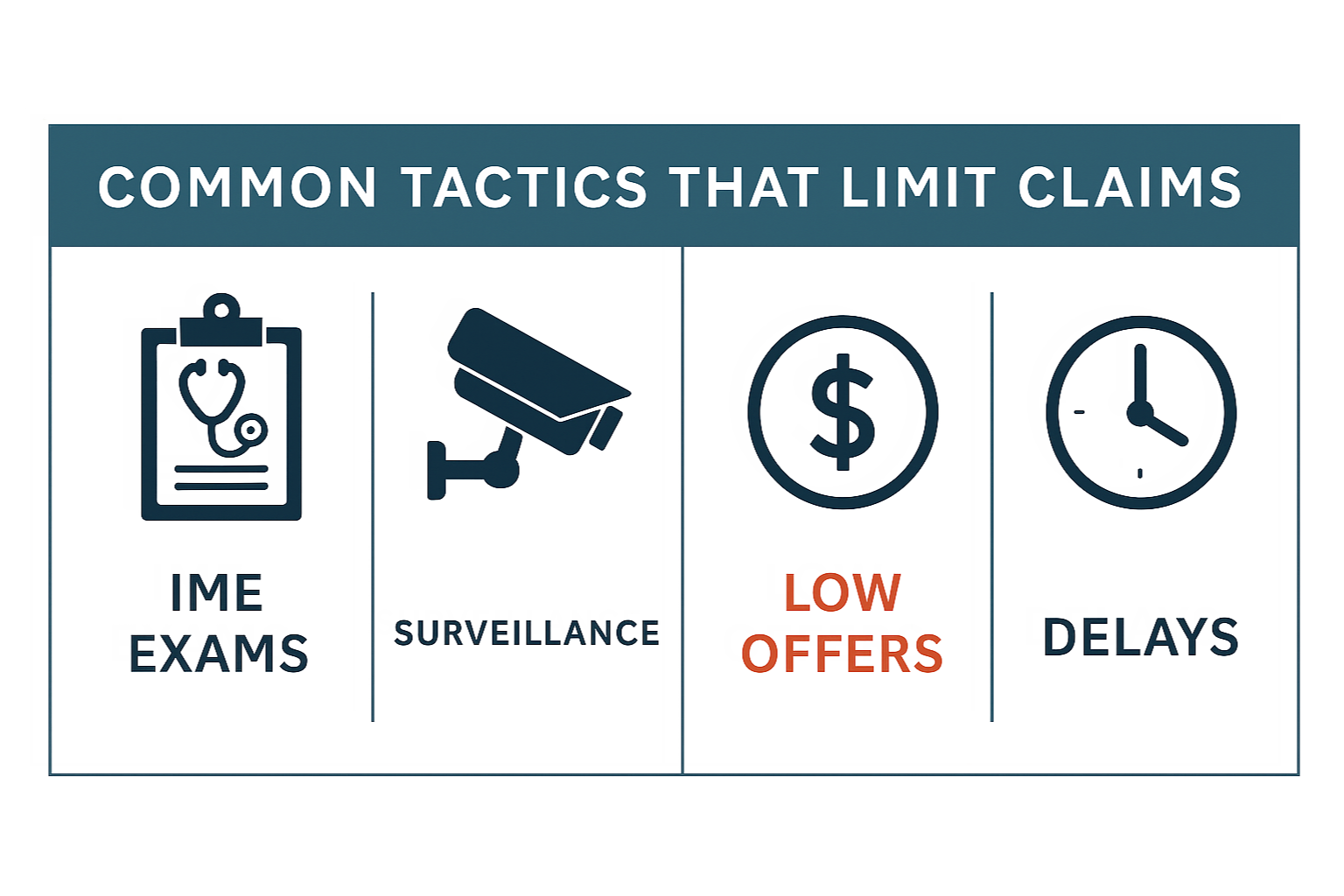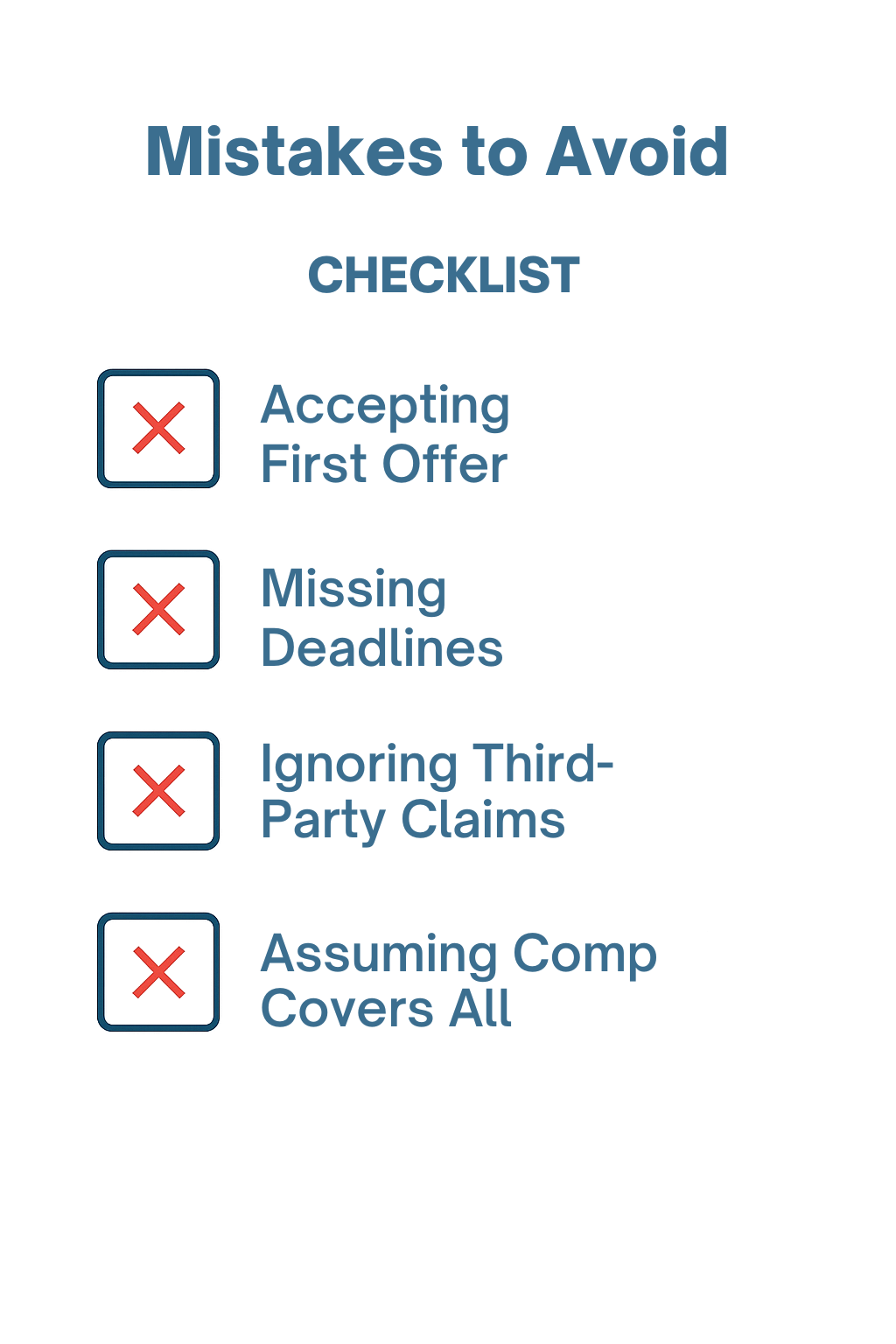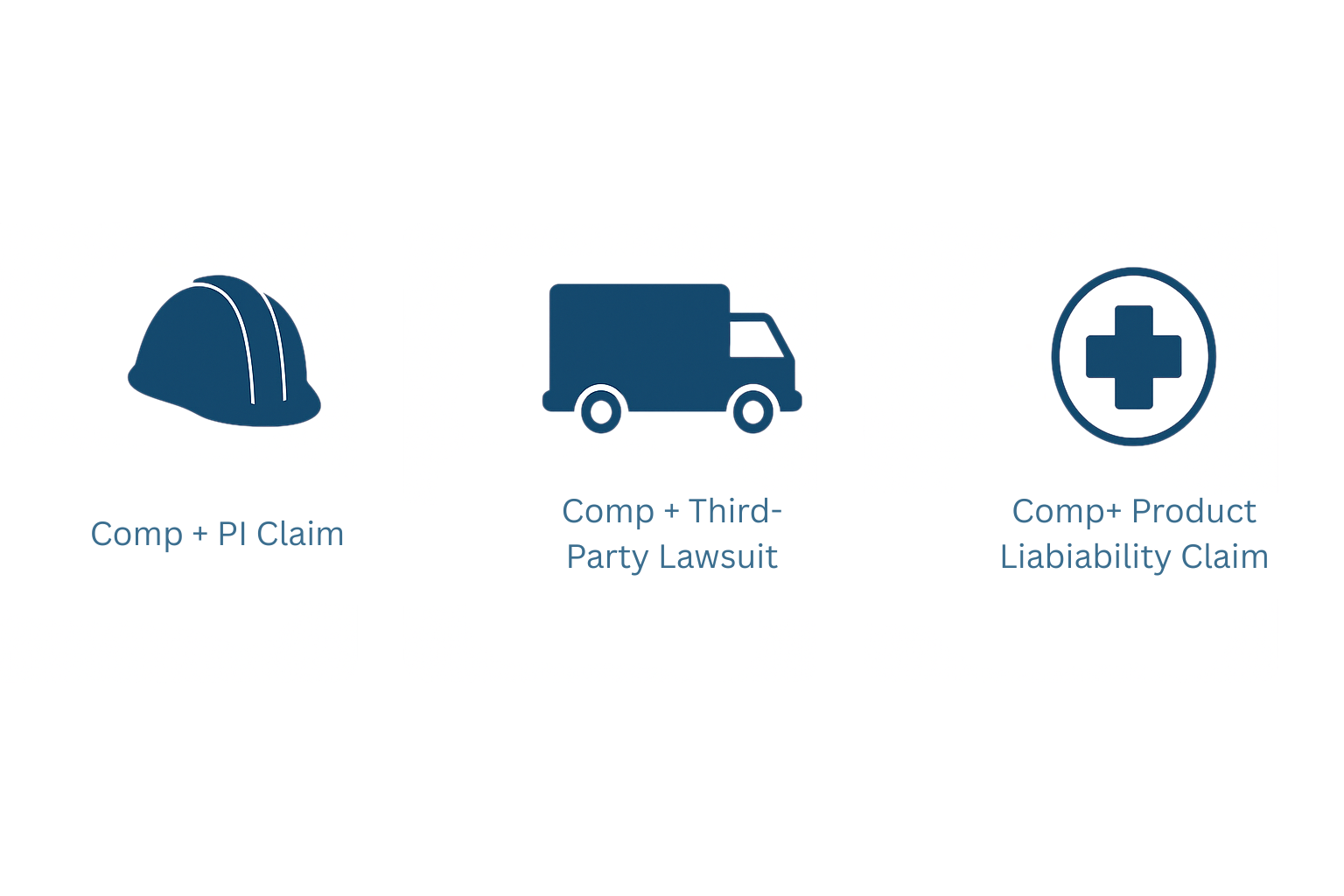The Role of a Personal Injury Lawyer in Worker’s Compensation Cases
When someone is hurt on the job in Pennsylvania, the first step is usually a workers’ compensation claim. This system is meant to cover medical bills and part of lost wages, but many workers soon find that these benefits have limits. Pain and suffering, full wage replacement, and other damages are not included. That is where a personal injury claim may also come into play.
The role of a personal injury lawyer in workers’ comp cases is to look beyond the basic benefits. If a third party’s negligence contributed to the injury, you may have the right to pursue compensation outside of the workers’ comp system. Our attorneys at Selingo Guagliardo have represented workers in both types of claims, making sure no option for recovery is left unexplored.
If you are asking, “Do I need a lawyer for workers’ comp?”, the answer depends on the situation. An experienced team of workers’ compensation lawyers in Pennsylvania can explain your rights, handle disputes with insurers, and determine whether a personal injury claim should be filed alongside your workers’ comp case.
Understanding Workers’ Compensation in Pennsylvania
The Pennsylvania Workers’ Compensation Act requires most employers to provide insurance for employees who are injured on the job. This no-fault system means that workers do not have to prove their employer was negligent to qualify for benefits. The goal is to provide access to medical treatment and partial income soon after a workplace injury.
What does workers’ comp cover in PA? Benefits include payment for medical care, wage loss benefits if you cannot work, compensation for permanent disabilities, and death benefits for surviving family members. These benefits are helpful, but they also have limits. Pain and suffering are never covered, and wage loss payments only replace part of your income rather than the full amount.
Another key feature is the exclusive remedy rule in Pennsylvania. This rule usually prevents employees from suing their employer directly, even when negligence contributed to the accident. While it makes the process more straightforward, it also limits recovery to workers’ comp in most cases.
Even with these protections, disputes are common. Claims may be delayed, denied, or underpaid, leaving injured workers uncertain about their future. We see these problems often, and many are described in our common workers’ compensation issues guide. The Pennsylvania Department of Labor & Industry also explains how the process is meant to work, though real cases rarely feel that simple.
What Makes Personal Injury Different from Workers’ Comp?
Workers’ compensation and personal injury law often get mixed up. Both deal with injuries, but the systems are built on very different rules. At Selingo Guagliardo, we handle both types of cases, so we know how important it is for injured workers to understand the difference.
Workers’ compensation in Pennsylvania is a no-fault system. If you were injured while performing your job, you do not need to prove your employer did anything wrong in order to qualify for benefits. Personal injury law works differently. In those cases, you must show that someone else’s negligence caused the harm. That could mean a careless driver hitting a delivery worker, a subcontractor failing to follow safety procedures, or a manufacturer producing defective equipment that injures an employee.
The damages available also separate the two systems. Workers’ comp covers medical bills, part of lost wages, and rehabilitation costs. These benefits help, but they do not address everything an injured worker loses. Personal injury claims go further. They may include pain and suffering, emotional distress, full wage replacement, and even punitive damages when misconduct is especially reckless. Our attorneys at Selingo Guagliardo have secured these damages for Pennsylvania workers whose losses went far beyond what comp alone could cover.
A major factor in Pennsylvania is the exclusive remedy rule. This rule usually bars employees from suing their employers directly, even when negligence is involved. It limits most cases to workers’ comp benefits. There are exceptions, though. When a third party contributes to the injury, such as another contractor, a negligent driver, or the maker of unsafe equipment, you may have the right to bring a personal injury claim alongside your workers’ comp case. These are the situations where our team’s experience makes a difference.
Selingo Guagliardo’s history of representing injured workers in both areas allows us to evaluate every possible claim. By working with personal injury attorneys in Pennsylvania who also understand workers’ comp, you can avoid leaving compensation on the table.
How Insurance Companies and Employers Limit Claims
Insurance companies and employers often work to reduce the cost of workers’ compensation claims. In Pennsylvania, that can mean using strategies designed to challenge or limit what an injured worker receives.
One of the most common tactics is sending employees to an independent medical examination, or IME. While these exams are presented as neutral, they are often used to question the seriousness of an injury. Insurers may also conduct surveillance, hoping to capture video that suggests a worker is not as hurt as they claim.
Low settlement offers are another frequent issue. Workers sometimes feel pressure to accept a quick payout that does not cover long-term medical care or lost income. In other cases, employees are pushed to return to work before they are physically ready, putting them at risk of further injury.
These tactics are common in the workers’ compensation system, and workers’ compensation basics show how insurers use them to minimize payouts. At Selingo Guagliardo, we challenge IME results, push back against unfair surveillance, and negotiate settlements that reflect the true cost of an injury. Our experience with Pennsylvania claims means we know these strategies well and how to protect workers from them.
Common Mistakes Injured Workers Make Without Legal Guidance
Filing a workers’ compensation claim may seem straightforward, but many people make errors that cost them benefits. At Selingo Guagliardo, we often meet workers who come to us after running into problems that could have been avoided with legal help.
One of the most frequent mistakes after a workplace injury is accepting the first settlement offer. Insurers know injured workers need money quickly, and they take advantage by pushing low agreements that do not cover future medical bills or long-term wage loss.
Another common mistake is overlooking third-party liability. Workers’ comp pays for medical care and partial wages, but if another contractor, a careless driver, or a defective product was involved, there may also be a personal injury claim. Ignoring that possibility leaves significant compensation on the table.
Deadlines also trip people up. Missing filing dates or waiting too long to report an injury can prevent benefits altogether. Many of the most serious workers’ comp claim mistakes in Pennsylvania come down to timing.
Finally, some workers assume comp covers everything. It does not. Pain and suffering, emotional distress, and full wage replacement are not included. Denials are also common, which is why knowing how to appeal a denied workers’ compensation claim is critical.
Our attorneys have decades of experience guiding Pennsylvania workers through these challenges, protecting their rights, and making sure they receive the full benefits they deserve.
Benefits of Hiring a Personal Injury Lawyer for a Workers’ Comp Case
Workers’ compensation was designed to make the process easier for injured employees, but in practice, it rarely feels simple. Claims get delayed, benefits fall short, and many people do not realize they may have another option through a personal injury case. Having a lawyer who understands both areas of law can make a major difference.
One clear benefit is the ability to look at the big picture. Workers’ comp pays for medical bills and part of your wages, but it stops there. A personal injury claim can add damages for pain and suffering, emotional stress, or the full amount of lost income. Lawyers who handle both claims know how to coordinate them so you do not leave money behind.
A lawyer also provides protection when insurance companies start playing games. Independent medical exams, surveillance, and low settlement offers are common in Pennsylvania. Without guidance, many workers feel pressured to accept less than they deserve. An experienced Pennsylvania work injury lawyer knows these tactics and how to push back.
Local knowledge is another advantage. Each county has its own way of handling claims. The lawyers at Selingo Guagliardo have spent decades in Pennsylvania courts, guiding workers through both comp and personal injury cases.
When you work with workplace injury claims in Pennsylvania, attorneys who know how to handle both claims together give you the best chance at a fair recovery.
Case Examples: How Dual Claims Work in Practice
Understanding the difference between workers’ comp and personal injury is easier when you see how the two claims can overlap. At Selingo Guagliardo, we have handled many cases where workers needed both types of claims to be fully compensated.
Take a construction worker who falls because a subcontractor ignored safety rules. Workers’ comp will pay for medical care and part of lost wages, but it will not cover pain, suffering, or the full financial hit from being out of work. By bringing a personal injury claim against the subcontractor, the worker can recover damages that go beyond the limited comp benefits.
Another common example is a delivery driver hit by a third party while on the job. Workers’ comp covers medical bills and wage loss, but the real value comes from pursuing a personal injury claim against the negligent driver. In this type of case, our attorneys make sure the workers’ comp claim moves forward while also seeking full recovery through the personal injury system.
A third example involves a nurse injured by defective medical equipment. Workers’ comp handles the immediate bills, but it does nothing to hold the manufacturer accountable. By filing a product liability claim, we can pursue additional compensation and force changes that may prevent other workers from being hurt in the same way.
These personal injury workers’ comp case examples show why it is important to look beyond the initial claim. Third-party work injury cases in Pennsylvania often provide a path to recovery that workers would miss without legal guidance. Our team focuses on identifying these opportunities and making sure every client receives the compensation they deserve.
Why Choose Selingo Guagliardo for Your Work Injury Case?
Not every law firm handles both workers’ compensation and personal injury, but that combination is often the key to a full recovery. At Selingo Guagliardo, we have built a reputation in Pennsylvania for doing both, making sure no opportunity for compensation is missed.
Our experience as workers’ compensation lawyers means we know how to fight delays, denials, and low settlement offers. At the same time, our role as Selingo Guagliardo personal injury attorneys allows us to pursue third-party claims when someone outside your employer contributed to the accident. This dual approach has helped our clients recover damages that workers’ comp alone could never provide.
Over decades of practice, we have represented construction workers, drivers, healthcare staff, and many others across Pennsylvania. Whether the case involved unsafe equipment, a negligent driver, or a denied claim, we have stood with our clients to protect their rights and secure results.
Choosing Selingo Guagliardo means your comp case and personal injury claim are handled together, with one plan built around securing the full compensation you deserve.
Get a Free Case Evaluation Today
If you were injured at work, you do not have to figure out the process alone. Workers’ compensation can be confusing, and many cases also involve personal injury claims that are easy to miss without legal help. Talking with an attorney is the best way to understand your options.
At Selingo Guagliardo, we offer free case evaluations to workers across Pennsylvania. In one conversation, we can review your situation, explain your rights, and outline the steps we can take on your behalf. There is no cost and no obligation, just answers to the questions you need resolved.
The sooner you act, the easier it is to protect your benefits and preserve important evidence. Schedule your consultation today and let our team guide you toward the full recovery you deserve.
Frequently Asked Questions (FAQs) About The Role of a Personal Injury Lawyer in Worker’s Compensation Cases
-
Yes, if a third party’s negligence caused your injury, you may be able to pursue both. Workers’ comp covers medical bills and part of lost wages, while a personal injury case can add damages for pain and suffering and full wage recovery.
-
Not always, but disputes, delays, or denials are common. A lawyer can help you file correctly, challenge insurer tactics, and identify whether additional claims may be available.
-
Personal injury claims may include pain and suffering, emotional distress, loss of enjoyment of life, and punitive damages. These are not part of standard workers’ comp benefits.
-
This rule usually prevents employees from suing their employer directly, even if negligence was involved. Exceptions exist when third parties, such as contractors, drivers, or product manufacturers, are responsible.
-
Our attorneys evaluate every case to see if both claims apply. We manage workers’ comp disputes while also pursuing personal injury lawsuits when third-party negligence is involved, ensuring clients receive the full compensation they deserve.





